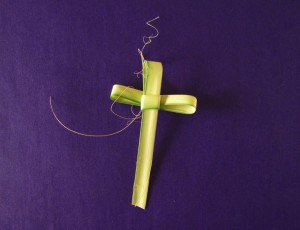Informant: Tracy McGeagh is my mother and was born with the name Mara Tracy Weiss. She is now 50 years old and lives in Pacific Palisades, California. She was raised in Malibu, California and in Santa Monica, California and went to College at UCLA. She got her Law Degree after she graduated college and practice Family law for many years and still does briefly today. Her mother’s side of the family is from Wales, with Irish- Catholic heritage and her Father is Jewish, with Hungarian blood. She was not raised practicing either of the two religions, but celebrated both Catholic and Jewish holidays. Later in life she decided to be confirmed as Catholic and not practice her Jewish roots. She had 3 children who she helped raise as Catholic as well.
Tracy: “On Palm Sunday, when you receive the palms that are given out, you make them into a cross shape out of respect for Jesus dying on the cross for our sins. You fold the cross over itself and tie it at the center. After you make the cross, since the palms were blessed, you can keep it in your room or your car to keep God close by.”

Palm Sunday is a Holy Day of Obligation in the Catholic faith, which means it is a day that is required to attend Church. The reason this day is important is because it is the day that Jesus entered into Jerusalem on the week of his death, knowing that he was going to be crucified before it happened. It is the beginning of Holy Week, which includes: Holy Thursday (The Last Supper), Good Friday (The Day Jesus Died), Holy Saturday (A Day of Waiting), and Easter Sunday (The Day of Jesus’s Resurrection). The ritual at Mass on Palm Sunday is that many palms are processed in, as they were when Jesus entered Jerusalem on the Donkey, and later these palms are blessed. They are distributed to those in the congregation, and the remaining palms are burned for the next year’s Ash Wednesday (another day of holy obligation). Forming the palms into a cross is a custom that my mother was taught by her Parish in Pacific Palisades and has also witnessed in numerous other parishes over the country. The practice was passed down to me and my siblings and is also practiced by my friends who are Catholic.
Personally, I think this craft is quite nice. It is a way to make the palms into and item that would want to be kept and demonstrated. It is also, used as a way to remember the reason for the Catholic faith and can be used as an item for prayer. Keeping it in one’s room or car is a custom that allows for the believer to feel the presence and protection of God on a daily basis, something that is nothing but valuable.
